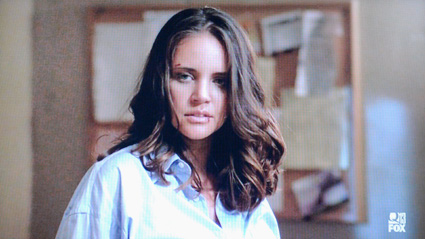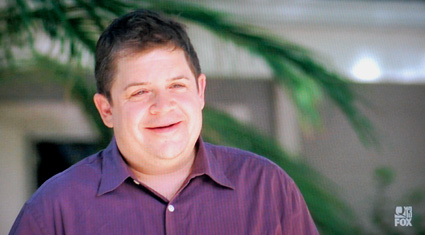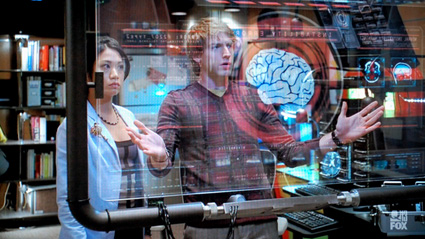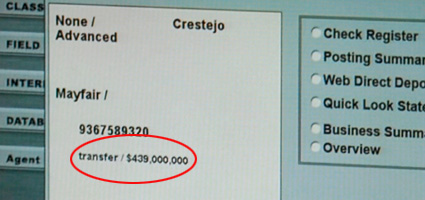
Holy smokes. That’s a lot of clams. Too much? Why, yes it is, but we’ll get to that in a moment. The bigger question to answer this week is whether or not the big sixth episode lived up to all the hype. We’ll have to wait for the ratings to see if it completely got there, but short of that, I will say that it was far and away the best episode of the series so far. There was a great guest spot from Patton Oswalt, a big reveal about the corporate structure of the Dollhouse, time to learn some new things about Mellie, and the suggestion of a conspiracy. It was a jam packed hour.
Update: Ratings are in. 4.13 million viewers and a 1.5 in the demo. Low, but holding most of the audience from last week. Now, after the best episode so far, will the numbers go up next week?
Let’s start with Echo’s engagement. Easily, the thing that stood out the most to me was the performance of Patton Oswalt as Joel. It wasn’t the typical performance I’ve come to expect from him. While I’ve always liked him, I came away from this one more impressed than ever with his acting ability. The scenes in the house with Ballard were especially good. That being said, Joel was part of one of the things I didn’t really care for in the episode. Combined with the man-on-the-street interviews, they seem to be trying to float this idea that there is some sort of moral ambiguity where the Dollhouse is concerned. And there really isn’t.

Sure, Joel has a sad tale to tell, and he’s not the worst guy in the world. And we can probably assume that the mountain couple had a successful birthing process. So, the Dollhouse does, occasionally, do something that isn’t completely horrid. But that doesn’t change the fact that these are evil, evil people. The lot of them. We’ve already heard of assassinations, and tonight there was at least a reference to the more sordid sexual engagements. Not to mention, the attic. When they talk about sending people to the attic, I’m guessing it’s not a petting zoo filled with adorable little puppies. Anyone that voluntarily works for the Dollhouse, unless they are working from the inside to take it down, is complicit, and by all definitions, very, very, bad.
Speaking of working from the inside… What did you make of that little nugget? It was clever how they set it up, with Boyd calling Topher out of the room, leaving the opportunity for the change to be made. So, we know it was possible that Echo’s imprint was tampered with. On the other hand, it did also serve to get Ballard off the case, so that could have been the plan from the start.

I’m leaning toward there actually being someone inside that sent Ballard the message. But who? The obvious answer is Ivy. She has the chops to run the equipment, and the fact that Liza Lapira has already been a double agent on NCIS makes me naturally suspicious anyway. The worst thing about her as a suspect is, of course, just how obvious it is. There’s no shock to finding out it’s her. Other candidates? How about Adelle? The revelation of 20+ more Dollhouses leads me down that path. Perhaps she has a different endgame in mind for the technology? Maybe Alpha, who technically wouldn’t be an inside man. But given that he was able to wipe Echo over the phone, I don’t have a problem getting to him messing with the imprint remotely, over the network. That one suffers from the fact that if you watch closely, the doors to the lab are closed when Topher leaves to talk with Boyd, but open when he comes back, suggesting an actual inside job. Finally, Dr. Saunders. She really doesn’t seem too thrilled with the way things are going, and Alpha must have left her alive for some reason.
Echo’s message also dropped another big hint that there is something bigger going on. She told Ballard, “The Dollhouse deals in fantasy. That is their business, but that is not their purpose.” So, if it’s not just a money making endeavor, what is the real endgame for the technology? Perfecting the technology so influential people can be imprinted and controlled? Building the perfect football team? And talking about the money, what’s the deal with the Dollhouse pricing scheme? $439,000,000? Huh? $43,900,000 would seem high. $4,390,000 would be in a believable ballpark. It just makes no sense at that number. As of 2007, there were only 946 billionaires in the world, averaging $3.6 billion each. Even assuming all of those are in the market for some great hookers, with 20+ franchises the Dollhouse would run out of customers pretty fast. It’s just a silly number.

Moving on, we finally got our answer to just what is up with Mellie. I have to say, I didn’t see it coming. It’s interesting how Whedon’s history works for him in this one. He’s got the reputation for killing characters, and after Mellie finally got together with Ballard, I feared for her. The phone call and reveal were shocking, and very cool, but they come at a price. The unfortunate bit of Mellie being a doll is that now that we’ve come to like her, we’re told that it was all a big lie. It’s the iffy bit about the dolls being the main characters.
I think the best solution for that is going to be more back story. There’s nothing in the day to day of the Dollhouse that really lets us identify with Echo, Viktor, and Sierra. And, actually, I’ve pretty much had my fill with them in the blank state. What will work, and has already started with Caroline, is some back story, for context. It gives us someone to root for. We don’t know what it was that got Caroline into the Dollhouse yet, but we have at least had a look at who she was before she went in, so it’s easy to root for her to get out of it. I’d like more of that for Viktor and Sierra. The Sierra story this week was tragic, but knowing who Sierra was before she came to the Dollhouse will go a long way toward getting viewers invested in the character.
So, where does that leave us? Unfortunately, waiting for ratings to come in. But aside from that grim reality, I think the best thing you can say about “Man On The Street” is that it is where the show went from, “I think it’s going to be good,” to, “Yeah, this is good.” It’s certainly not perfect, but so few shows are. For a new show only on it’s sixth episode, this was a great showing.
Don’t forget the million dollar visit to the sick little girl in the cancer ward. See, they do good things for a ridiculous price as well as bad!
The part that did me in was Ballard wipes the floor with five or six of Joel’s bodyguards, then lets this annoying john monologue his life story at him for what seems like twenty minutes. Ballard even answers personal questions from this guy, and doesn’t even bother to question him harder for any information about the Dollhouse, let alone worry that one of the bodyguards is going to wake up and interrupt the “interrogation.” He’s already in it deep for all kinds of crimes, so I didn’t understand why he didn’t cut off Joel’s snark by popping him one in the mouth. Okay, the writer speaking directly to the audience through the TV interviews was a little too on-the-nose, but this part just didn’t make any sense.
The great thing about Dollhouse is that anyone might be a doll. Ballard, Langton, DeWitt, Mr. Dominic, and so on, are all candidates in my opinion. What if everything is fake? I enjoy the nagging feeling at the back of your mind wondering, ‘is this person real or just someones pawn?’
I didn’t get any sense of moral ambiguity from the Patton Oswalt monologue. It struck me as more of a confession. His point didn’t seem to be that what he was doing in buying the services of The Dollhouse (repeatedly) was right, or even justifiable. I think it boiled down to him saying that he was not strong enough to resist the temptation to create a fake “perfect moment” that never happened, once he knew it was both possible to create such a realistic forgery of the situation, and that it was well within his means to purchase that service.
The fact that he kept buying the same “moment” over and over again also makes the point that the simulated experience of a catharsis wasn’t really satisfying, but that it was just an anodyne of some sort. He even said it directly: “It IS a fantasy.” As it was, that made his character seem perhaps more dependent than actually satisfied. Maybe the point of the operation is to create these sort of weaknesses and dependencies among the global financial (and possibly political) elites.
As to the pricing issue, you make a good point, but you could explain that number away in a few ways. (And please forgive me for further pursuing this relatively trivial point given the remaining huge holes in the show’s premise & logic. As a wise man once said: “Just repeat to yourself ‘It’s just a show. I should really just relax.'”) Maybe there is a sliding scale for clients, based on some percentage of wealth. A simpler explanation is that since these transactions are supposed to be clandestine, they are either hidden within larger, apparently legitimate transactions (i.e. buying something large at a slightly inflated price) or concealed in a series of transactions. The plot point isn’t the number on the screen as such, it’s just that there is a financial trail from Patton Oswalt to the nefarious corporate overlords of The Dollhouse.
Overall, I think the risk of hyping this episode paid off, since it did deliver the promised expansion and redefinition of what the show is about on an ongoing basis, instead of being just an endless parade of “Personality of the week.” It felt more like a Joss Whedon show this time around, extended fight choreography and all…
*POST AUTHOR*
I thought about a sliding scale, but I was thinking more along the lines of what the engagement is. But even that falls flat when you compare the two engagements they referenced. Clearly, what Joel was asking for was world’s simpler, and you would think could come at some sort of a discount. I like the idea of the Dollhouse payments being hidden inside of larger transactions, but then you have to ask why the giant red flag of using the same obscure huge number? The whole pricing bit was silly, but you are right, it is ultimately a trivial point.
With the moral abiguity I wasn’t talking about Joel specifically so much as the overall tone. I get the feeling that the show is reluctant to just name the people of the Dollhouse as the outright monsters that they are. So we see this sympathetic client instead of the frightening amir that Hearn mentioned. And we have the man-on-the-street videos questioning whether or not its really a bad thing. I’m not seeing that grey area they are sturggling to push.
Millie as a Doll had unfortunately been spoiled for me for quite some time. IMDB had originally listed her character name as November (Its changed now).
I’m with you. Its a character I liked quite a bit, but now is, basically, just another card in an index file.
I liked the ‘game change’ portion of the show. First, there are multiple Dollhouses, and that there are forces at work to help Ballard. I’m looking forward to how it plays out.
I’m with String… I don’t think that the show was trying to morally justify the concept of the Dollhouse, but that people, specifically Oswalt’s character, aren’t strong enough to overcome the temptation.
great episode.
One of my problems with the show was the lack of contempt for the concept of the dollhouse and the prostitution or slavery of the dolls.
I can get over that now that it has been addressed. It bothered me that it was the premise of the show, but now it is more clearly a ‘part’ of the show and why the dollhouse needs to be shut down. Clearer definition of what the show will be about.
I also thought Mellie was an imprint from hearing about November. So, that scene was not entirely shocking, but I was surprised.
I liked the first shows, but I think they will get better going forward.
I found Joel’s explanation for using the dollhouse to be sad. While it doesn’t justify the use of a doll, in a way, for him how was it different than getting a prostitute off the corner? Does he really understand the ramification of what the ‘doll’ is? I didn’t get the indication that he saw her or was told she was a slave vs. a prostitute. HUGE difference, right?
*POST AUTHOR*
Dorv & cj, I was actually spoiled about Mellie, and then unspoiled. After the original pilot was scrapped and they had the production troubles, there was an interview with Whedon where he said that they had to cut the character of November, but Miracle Laurie was remaining with the show in another role. I took him at his word, so I was surprised when she did turn out to be a doll, after all.
Even if I had not known in advance that Millie was a doll, I would have pegged her for one immediately. Lasagne and aprons! How quaint, clearly a programmed function. Free non-dolly girls offer baked goods, everyone knows that! :)
Lets not forget, BSG, she also offered a cup of sugar.
As far as the morals go, at the end of the day, its clear to us that the “bad guys” are the ones running the Dollhouse.
One thing I hadn’t realized until now, Penikett is a tall dude.
Brett: I read the same thing, but the seed was there. The Dollhouse sending Millie to keep an eye on Ballard just made good sense.
Its a shame though, I enjoy Millie as a character. That, and I really would like to see more of Miracle Laurie as an actress. I’m surprised she doesn’t have more on her IMDB page.
Actually, I believe Mellie made some kind of “neighborly” comment, prompting Ballard to ask for a cup of sugar. This was the postcoital scene.
One of the other things… I’m curious as to why so few people are considered part of the principal cast. Reed Diamond (Who is elegantly creepy on the show), Acker, Laurie… Why haven’t they been brought on board as full cast members. What characters are sticking around, and who isn’t?